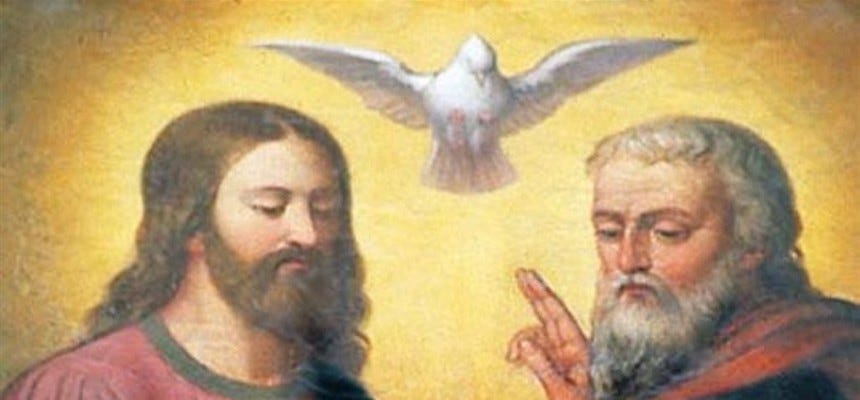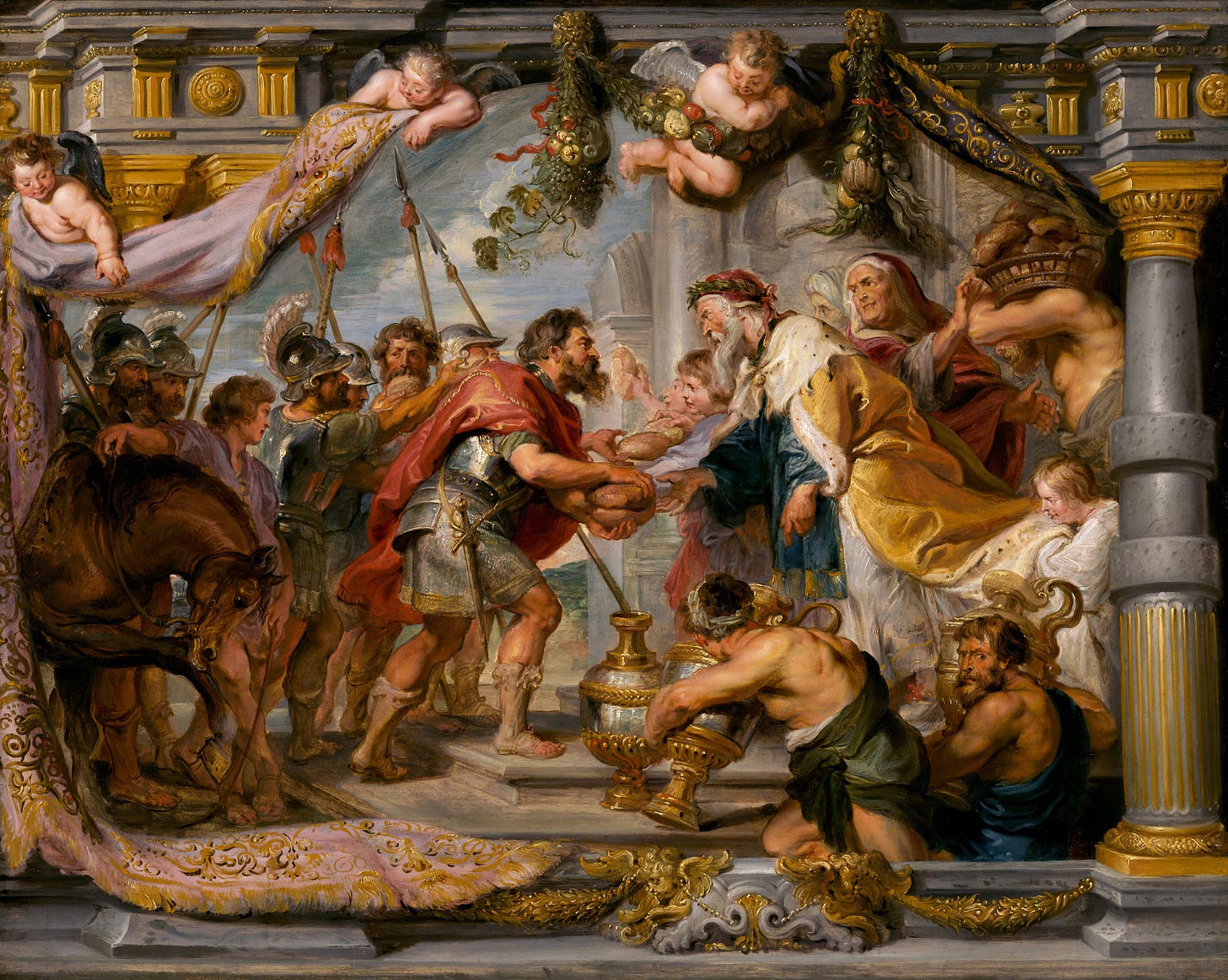“Deus otiosus” is a Latin phrase that translates to "neutral god" or "inactive god." It refers to a god who may exist but has withdrawn from active participation in the world. This resembles the deistic god of the Enlightenment, who may be responsible for the design and order that are evident in the universe, but otherwise does not concern himself with Creation any further than that. He is the “Great Watchmaker” who creates the clock, sets it in motion then goes away. This notion was popular in the early days of the Scientific Revolution as discoveries such as Newton’s laws of gravitation made it clear that the universe follows definable and discoverable physical laws. The laws appear intelligent and had to come from somewhere. Because Enlightenment philosophers were opposed to Catholicism with its robust masculine God, they wanted to explain him away entirely and replace him with science and reason, but couldn’t. An emasculated god was their compromise answer. This is the god of scientism.
A God conceived of this way may be responsible for what is, and may even be Being himself in which all other beings subsist, but it doesn’t make him very approachable. If he is an infinite being, immanent, omnipotent, purely spiritual and outside of time, the chasm between himself and his physical creatures is staggeringly insurmountable. There is also no particular reason why such a distant and austere god would be interested in communication. Even further, a magnificently austere god doesn’t necessarily have an intrinsic ability to communicate even if he wanted to. He is like a law of nature himself, just writ very large into a god. It is no surprise that the classical Greeks who explored the outer limits of natural reason, were not ignorant of the notion of monotheism. It is also no surprise that they ultimately preferred to stick with a dysfunctional gaggle of all too personal pagan gods who were highly entertaining, emotionally satisfying, and better at explaining their actual lived experience, even if they were all a fiction.
Someone might object that if this Great Watchmaker god is capable choosing at least a little, then it follows that he has qualities of a self-aware person — he is then not a blind law of nature, even if his vision isn’t very good. After all, he at least chose to make the universe and then chose to withdraw from it. If that is the case and he also happens to be intelligent and outside of time, then he seems likely to be self aware — he could know that he is and what he is and what he is choosing. Thought of that way, even the Great Watchmaker god starts to sound like he’s on a slippery slope sliding toward a triune God?
That raises an interesting question. Is a creator god who is not personal even possible? Is he then a god or is he just a law or principle of nature? A god by definition has exceptional or supernatural powers and is worthy of worship. No one sane prays to or worships gravity or electromagnetism.
While the evidence for an Intelligence and a Mind underpinning the universe is overwhelming (and we will discuss it in great length in future posts), we cannot definitively know very much about the nature of God by speculation alone. God has to tell us.
“I AM WHO AM” (Exodus 3:14).
This is perhaps the most exhilarating phrase God could utter about himself. God is what is and that is a person. Let’s talk!
What are the next steps in the conversation? God teaches us rules of behavior (Ten Commandments, etc.) and the rules of liturgy (how to build the temple, offer sacrifice, choose priests, etc.).1 Those are the basics of how our conversation with him needs to go.
The basic reason why man can speak with God arises from the fact that God himself is speech, word. His nature is to speak, to hear, to reply, as we see particularly in Johannine theology where Son and Spirit are described in terms of pure “hearing”; they speak in response to what they have first heard. Only because there is already speech, “Logos”2, in God can there be speech, “Logos”, to God.3
This infinitely personal God is not just grudgingly willing to communicate. It is fundamental to his very nature. However, his nature as a Trinity also means that the only conversation God absolutely needs to have is within Himself. The Father is in infinite communication with the Son through the Holy Spirit. This infinite conversation is where the Holy Spirit explores the very depths of God.
God has revealed them to us through His Spirit. For the Spirit searches all things, yes, the deep things of God. For what man knows the things of a man except the spirit of the man which is in him? Even so no one knows the things of God except the Spirit of God. Now we have received, not the spirit of the world, but the Spirit who is from God, that we might know the things that have been freely given to us by God (1 Corinthians 2:10-12).
Paul points out that there is a progression of communication. First there is the Father, then the Father to the Son, then the Spirit searching them both. Then through the Spirit, they are revealed to us. How does that happen?
There is a great chasm between the divine conversation and human creatures. It is through the Incarnation of the Logos as a man, that human speech is brought into the Triune conversation through the Second Person who combines both divine and human nature into his single Person.
It is easy to see how prayer works with a God like this whose very nature and being are nothing but a Conversation. Contrast this to a strictly monotheistic god who has no Logos, no internal communication, because there is no one to speak with. There is also no Incarnation through which human speech is brought into the divine Conversation. Rather than simply being a distant Great Watchmaker or other austere figure, the Christian triune God is the very essence of personal communication. Without this understanding, the other supposedly “great Abrahamic religions” who do not recognize a Trinity or an Incarnation cannot explain how their prayers work!
Praying is a very good thing, but as we’ve discussed in previous posts, deification is the real goal. Participation in the offering of Son back to the Father is the ultimate participation in the eternal dialogue within the Trinity and the essence of deification. The Mass is the ultimate prayer. It is the in-time re-presentation of the eternal offering of the Son back to the Father. It allows us to glimpse this heavenly reality here on earth until we can witness it ourselves in heaven when our deification is complete. When the earthly veil is parted at the Orate Fratres and we’ve witnessed his Passion concluded at the Consecration, it is at the Supplices Te Rogamus, where Christ’s offering of himself on the Cross is carried by himself to the Father.
We most humbly beseech Thee, almighty God, command these offerings to be borne by the hands of Thy holy Angel4 to Thine altar on high, in the sight of Thy divine majesty, that as many as shall partake of the most holy Body and Blood of Thy Son at this altar, may be filled with every heavenly grace and blessing. Through the same Christ our Lord. Amen.5
Mass is the ultimate prayer because it is this heavenly reality brought to earth. In order for it not to be just play acting and dumb show, an in persona Christi6 priest is required to offer an actual divine sacrifice. Only Christ the Son himself can offer his sacrifice back to the Father on behalf of the people, because that is a Conversation that is between them. That is why the priest has to belong to the same order as Christ the High Priest — the order of Melchizedek — and indeed be Christ himself at the moment he performs his priestly work.
The Meeting of Abraham and Melchizedek, c. 1626, Sir Peter Paul Rubens, the National Gallery of Art
The work of the priest is sacrifice to God. This sacrifice is done by him on behalf of the people, whether this is done by the High Priest Christ himself or an in persona Christi priest consecrated to become Him. The word “liturgy” comes from the ancient Greek λειτουργία (leitourgía), which itself comes from λαός (laós, “people”) and ουργός (ourgós) or ἔργον (érgon, “work”). Therefore the work of the priest is liturgy — the public work of the people done on behalf of the people.
Logos is Greek for “word” and is used to mean the sayings of God.
Joseph Ratzinger, The Feast of Faith, (San Francisco: Ignatius Press, 2006) 25.
An “angel” is simply a messenger. In this context, it is most likely the Son himself or perhaps the Holy Spirit since no created being could possibly mediate the awesome conversation within the Trinity.
Dom Gaspar Lefebvre, St. Andrew Daily Missal, (Great Falls, Montana: St. Bonaventure Publications, 1999) 976-977.
“In persona Christi,” Wikipedia, accessed December 12, 2024, https://en.wikipedia.org/wiki/In_persona_Christi.






